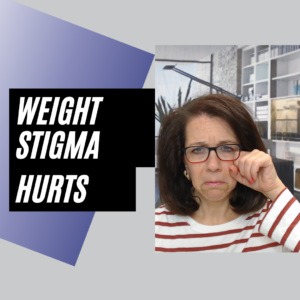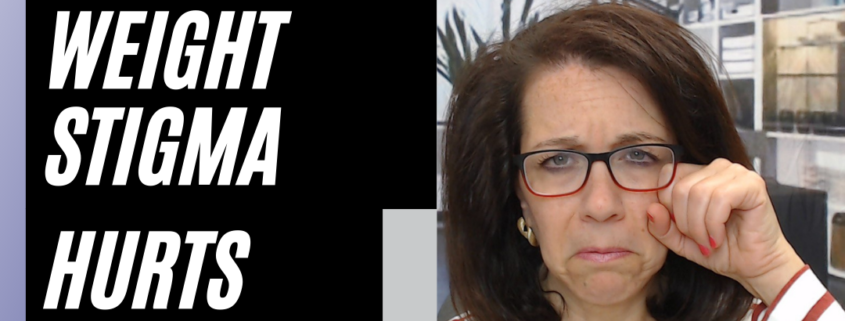The Damage of Weight Stigma
 Whether we see it or not, weight stigma is all around us. In our workplace, in where we shop, in our doctor’s office, within the people we associate with—it be found everywhere!
Whether we see it or not, weight stigma is all around us. In our workplace, in where we shop, in our doctor’s office, within the people we associate with—it be found everywhere!
Research has suggested that the impact of weight stigma goes far beyond feeling bad or insulted about the size of our bodies—it can wreak havoc on our mental, emotional and physical health.
What is Weight Stigma?
It’s a term used often but many don’t really understand what it means.
Weight stigma is also known as weight bias, weight-based discrimination, fat stigma, or fatphobia. In the most simplest of terms, it is the consistent oppression against people of larger bodies.
Weight stigma can appear in your world (and in your life) on a wide spectrum, what some might call minor and major (although in my opinion, there is no minor weight stigma. Weight stigma is weight stigma, it’s all damaging!)
Minor forms of weight stigma are also known as microaggressions and can be instances such as being spoken to disrespectfully by a store employee as a person in a larger body.
Major forms of weight stigma can include being denied employment or bullied by coworkers or other peers due to your size.
The forms of weight stigma, no matter where they fall on the spectrum, can be extremely damaging to your physical, mental and emotional health—here is what weight stigma can do:
(1) Weight stigma places you at risk for poorer health outcomes.
Research has suggested that “weight stigma is an independent health risk factor” for poor health. This concept is important because many doctors and other healthcare professionals blame “weight” for the various health outcomes associated with being in a larger body
In other words, doctors believe weight is the cause of various negative health outcomes (not true!)
The evidence:
- A study conducted in 2017 found that those who experienced high levels of weight stigma have more than twice the risk of high allostatic load (a measure of cumulative stress on all body systems) (source: https://christyharrison.com)
- Another study found that weight stigma was a greater risk factor for poor health outcomes than what the participants ate
(2) Weight stigma damages your mental health.
Research suggests that weight stigma is associated with greater amounts of body dissatisfaction which increases risk for a number of mental health issues including depression, anxiety, low self-esteem and disordered eating. These associations occur regardless of BMI.
There is also an association with high-risk health habits like increased use of cigarettes, driving under the influence, and other risky behaviors, all as a result of continued weight stigma.
(3) Weight stigma places your body under extreme stress.
Weight stigma is correlated with the stress response and the release of a variety of hormones and effects on the body such as:
- Increased levels of cortisol (aka a stress hormone)
- High levels of C-Reactive protein
- Release of proinflammatory cytokines
- Increased blood pressure
- Increase rate of oxidative stress
With the stress response being so extreme, the varying levels of hormones can contribute to increased metabolic risk and weight gain.
(Source: https://www.todaysdietitian.com/newarchives/0118p24.shtml)
(4) Weight stigma creates health care disparities.
Experiencing weight stigma from health care providers (doctors, nurses, etc.) is unfortunately a very real reality for those in larger bodies. Research suggests that the doctor’s office is the most frequent source of weight stigma (this is especially true for women!)
Furthermore, it has been found that those in larger bodies are often misdiagnosed by physicians and misattribute signs or symptoms they are experiencing to their body size.
This kind of mistreatment leads to larger bodied individuals going to the doctor less often, being misdiagnosed more, and not receiving the proper evidenced-based care they deserve.
What to Do?
Fight back! Surround yourself with others who are fighting back, and stand up for yourself.



